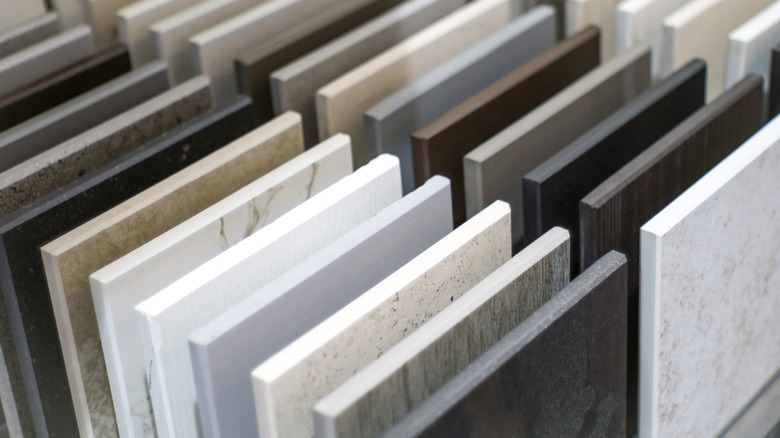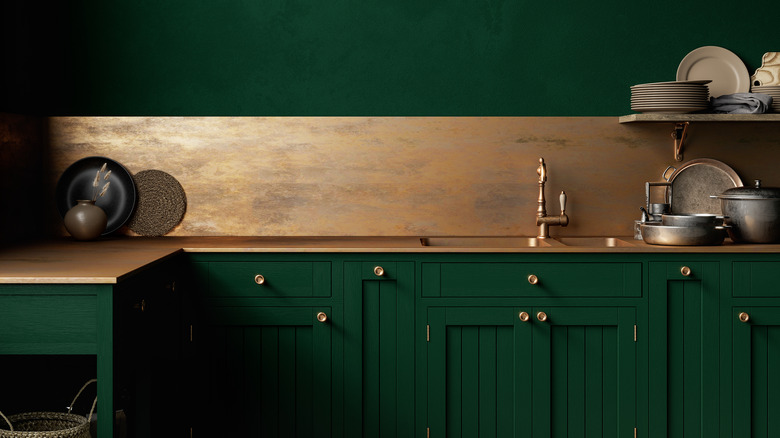The Unique Countertop Material You May Want To Avoid Putting In Your Home
If you're remodeling your kitchen and browsing the latest types of countertops on social media, chances are you've come across copper ones. These metal countertops have gained adoration from the general public due to their striking appearance, ease of cleaning, and statement-esque stature. Plus, they go with all types of decor, be it rustic, contemporary, farmhouse, or industrial. If that weren't enough to give other countertops a major complex, a few alloys might also be antimicrobial by nature. But, before you go and crown it the best countertop material ever, you should know about its drawbacks, too.
For starters, copper countertops are incredibly expensive and will burn a hole in your pocket, especially if you're on a tight budget. Moreover, this metal countertop isn't perfect by any stretch of the imagination. It's susceptible to scratches, oxidizes with natural elements, and can create a grating noise when it comes into contact with metal pots and pans. So, if you'd rather not go for a pricey option that will develop dings along the way, it's best to avoid putting copper countertops in your home.
Copper countertops are incredibly expensive
As mentioned, copper is one of the most expensive countertop materials. To put this into perspective, you can expect to pay anywhere between $5,500 and $9,625 for installing merely 55 square feet of the metal countertop. Put another way, you'll have to shell out at least $100 to $175 per square foot. That's not all. You'll also have to account for labor costs, which can further increase the price by $10 to $30 per square foot. While you can go the DIY route to save considerable costs on installation, it's not recommended for multiple reasons.
First of all, you should be extremely well-versed in the art of DIY to take on a project of this scale. Otherwise, you risk hurting yourself. Additionally, if the installation isn't seamless, the expensive countertop won't look its best and will make your kitchen look dingy. Another factor to consider is your kitchen size; the bigger the space, the more material you'll need. The thickness of the copper you choose will also have a significant impact on the cost; a thicker slab will be more than a thin one. A textured or customized countertop will also add to the price. In terms of expense, copper has other materials like ceramic, porcelain, and granite beat.
Copper countertops oxidize and get damaged
While a copper countertop is known for its charm and warm tone, know that this is a "living" material. This means that copper actively reacts with oxygen and changes colors naturally. So, expect to see your beloved countertop develop a brown, green, or red patina over time. Though this will add character to your kitchen and give it a truly unique look, it might not be the right choice for you if you'd rather your countertop maintain its original tone throughout.
Copper also needs to be sealed regularly with a butcher's wax or beeswax to maintain its luster. Although this is a fairly straightforward process, regular maintenance will add to your workload. Moreover, you'll have to wipe off acidic spills, like vinegar, orange, and lemon juice, or the surface might get stained.
Another strike against this material is that it's a sensitive metal and will get scratched easily. Kitchen essentials, like knives, will ding and dull the countertop; heavy pots and pans will dent it; and hot objects might leave burn marks. These will be especially noticeable on a copper countertop with a patina. If you've considered all of the pros and cons and still want copper countertops, you'll have a singular kitchen. If the downsides are just too much, a more common material may be the best choice for you.


